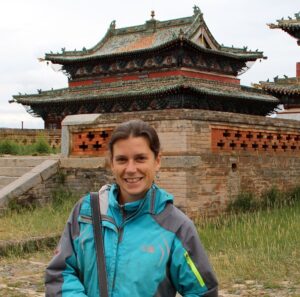Two doctoral students with strong ties to the University of North Carolina at Chapel Hill have received one of the nation’s most prestigious awards for Ph.D. candidates whose dissertation topics address questions of ethical and religious values.

Dáša Pejchar Mortensen, a doctoral student in history at Carolina, and Emily Ransom, a Carolina undergraduate alumna and doctoral student in English at the University of Notre Dame, are among the 22 individuals nationwide to receive 2015 Charlotte W. Newcombe Doctoral Dissertation Fellowships. Each awardee receives a 12-month, $25,000 stipend to support the final year of dissertation work. Fewer than 5 percent of applicants nationwide received fellowships in 2015.
“Graduate students bring us truly exceptional ways of understanding our world,” said Steve Matson, dean of The Graduate School at UNC-Chapel Hill. “Through their research, these students help us navigate critical issues. I commend Dáša and Emily for the superlative quality of their work. This fellowship provides the ability to work full-time on producing the very best dissertation, and is a remarkable opportunity for all awardees.”
Mortensen’s dissertation is titled “Historical Amnesia in Shangri-la: The Contested Legacy of Tibetan Participation in the Chinese Cultural Revolution.”
“My dissertation examines how residents of an ethnically diverse county in southwest China remember and interpret the recent past,” said Mortensen. “I explore how official historical narratives have influenced the ways that local people have come to terms with the trauma of the Mao era. Recent history remains deeply contested in China today, and my project demonstrates that politics, history and memory are central to understanding contemporary ethnic and religious identities in southwest China.”

Ransom’s dissertation is titled “Redeeming Complaint in Tudor and Stuart Devotional Lyric” and, said Ransom, “reveals the way Renaissance devotional poets used English complaint to explore a redemptive role for human passions in the face of extreme suffering. In the midst of the political and religious violence of the English reformations, Catholic and Protestant poets shared poetic techniques that use complaint not as an expression of powerlessness or escape but as a means of transforming the material world.”
Newcombe Dissertation Fellows are writing on topics as diverse as the interconnected histories of poverty and slavery across the United States and the British Empire, and the issue of frozen embryos left over from in vitro fertilization and saved for future use.
The Woodrow Wilson National Fellowship Foundation administers the Newcombe Dissertation Fellowship competition at the request of and in consultation with the Charlotte W. Newcombe Foundation, a private foundation. Since 1981, the fellowship has supported more than 1,100 doctoral candidates, most of them now noted faculty at national and international institutions.
By Deb Saine, The Graduate School
